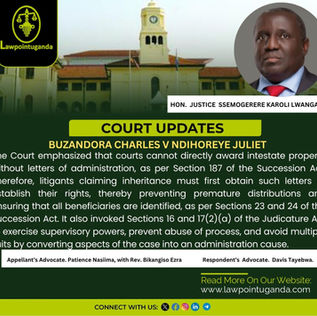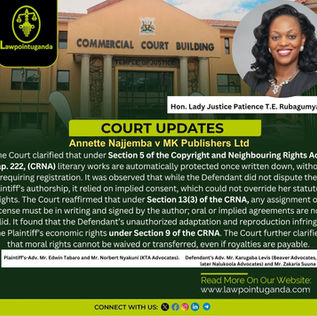top of page
BLOG POSTS
DISCLAIMER
This blog does not contain legal advice. The legal information is provided for general informational and educational purposes only and is not a substitute for professional advice. Accordingly, before taking any actions based on such information, we encourage you to consult with the appropriate professionals. Authors are liable for any plagiarism and Lawpoint Uganda won`t have liability towards the same.


England Court of Appeal Upholds Core Immunity for Advocates and Court Participants Versus Uganda’s Penal Weaponization of Contempt: A Comparative Analysis
Whereas the English court emphasized core immunity as a protective shield—ensuring participants can engage freely in proceedings without fear of personal liability, even for inadvertent errors—the Ugandan court’s stance reflects an inclination to weaponize contempt as a deterrent against outspoken criticism of judicial authority.

Waboga David
Oct 164 min read


High Court Dismisses Application for Stay of Execution in Criminal Contempt Proceedings Involving Scandalization of the Court
Contempt of Court may be classified as either (1) Criminal Contempt, consisting of words or acts which impede or interfere with the administration of justice, or which create a substantial risk that the course of justice will be seriously impeded or prejudiced; or (2) contempt in procedure, otherwise known as civil contempt, consisting of disobedience to the judgment, orders or other process of the Court and involving a private injury..

Waboga David
Oct 166 min read


WhatsApp Messages Cannot Amend or Substitute Written Contract Terms, Clarifies the High Court.
The applicant’s reliance on WhatsApp messages to prove an alleged term that two acres of land were to be in a waterlogged area and three acres on dry land was rejected. The Court held that the messages only confirmed pricing and did not evidence any contractual obligation regarding the nature of the land. It emphasised that only terms expressly incorporated in a written contract are enforceable, and alleged oral variations or assumptions must be strictly proved. While electro

Waboga David
Oct 154 min read


The Industrial Court Has Reaffirmed that under Regulation 45(1) of the Employment Regulations, an appeal from a Labour Officer’s decision is commenced by a notice of appeal, not a memorandum of appeal
Under Section 93(1) of the Employment Act and Regulation 45(1) of the Employment Regulations, S.I. No. 61 of 2011, an appeal from a Labour Officer’s decision is initiated by filing a notice of appeal within 30 days in the form prescribed in the Seventeenth Schedule.

Waboga David
Oct 145 min read


High Court of Uganda Clarifies Grounds for Piercing the Corporate Veil.
The Court held that Section 34 CPA is a directive to the court, not a bar to parties filing a suit. It aims to save judicial time and costs but does not invalidate proceedings filed by plaint.
“It is my understanding that this provision does not dictate the nature of proceedings whether by application or plaint… It is instructive to court and not the parties.” the judge emphasized that the section permits courts to treat execution proceedings as a suit, and hence, this suit

Waboga David
Oct 135 min read


High Court at Kabale Convicts Boda Boda Rider for Aggravated Robbery of Police Officer in Kabale District
The Court emphasized that assessors must exercise caution when recommending conviction based solely on the testimony of a single identifying witness. Citing Abdallah bin Wendo and Another v R (1953) 20 EACA 166, the Court stated that the evidence of a single witness regarding identification must be scrutinized with the greatest care. Furthermore, the Court held that the circumstances surrounding the commission of the crime must be carefully evaluated to determine whether reli

Waboga David
Oct 135 min read


High Court Clarifies Principles for Interim Measures in Arbitration and Enforcement of Performance Bonds
Facts Adler Construction Company Ltd (the Applicant) applied under Section 6 of the Arbitration and Conciliation Act, Cap. 4 and...

Waboga David
Oct 125 min read


Nothing in the law precludes a Labour Officer from making a reference for damages to the Industrial Court in the interest of substantive justice as provided under Article 126(2)(e) of the Constitution
The Court acknowledged that while LADASA sets an eight-week limit for references, precedents such as Bosa v Post Bank (U) Ltd [2020] UGIC 33 and Adilo v Afro-Plast Enterprises Ltd [2023] UGIC 42 permit a Labour Officer to refer questions of damages to the Industrial Court in the interest of substantive justice. The Court held that the LO’s reference was valid, having been properly transmitted with the arbitral record. Hence, the matter was properly before the Court.

Waboga David
Oct 114 min read


Under Section 256(2) of the Succession Act, Letters of Administration remain valid for two years from the date of grant. There is no need for validation within this period unless they've expired
A moot prayer is one, that even if it is granted, it would have no practical effect on the rights or obligations of the parties before the Court. The law is clear that courts do not entertain applications seeking reliefs which are purely academic or devoid of any operative effect.

Waboga David
Oct 114 min read


Failure to Repay a Loan and Breach of Settlement Terms Constitutes Contractual Breach, and Intermediaries/Guarantors May be Liable for Mishandled Collateral, Rules High Court at Kampala
The Court found that the 3rd counter defendant, Coronet Consult Ltd, violated its contractual duty under the collaboration agreement by releasing the 1st counter defendant’s stock, valued at UGX 208,400,000, without authorization.

Waboga David
Oct 104 min read


High Court at Kabale Convicts, Twesigye Simon Kyemese, for aggravated robbery, affirming that once an accused chooses to testify, inconsistent statements may reinforce the prosecution’s case.
The Court accepted that crimes like robbery often occur at night, relying on a single identifying witness. Citing Abdullah Nabulere & 2 Others v Uganda (Cr. App. No. 9 of 1978), the Court noted that the reliability of such evidence depends on the conditions and the witness’s prior familiarity with the accused. The complainant had known the accused for over a year and identified him by moonlight—rendering the identification credible.

Waboga David
Oct 93 min read


UGANDA’S JUDICIARY AT 63: FROM COLONIAL COURTS TO CONSTITUTIONAL GUARDIANS
As one historian notes, the colonial judiciary was “an ‘integral part of the oppressive apparatus of the state’… created by the colonial state to guarantee law, order and its ultimate preservation”.[3] Parallel “native” courts, kingships’ Lukiiko in Buganda, Ankole, Toro and Bunyoro continued limited local customary adjudication, but these were subordinate and eventually dismantled.

Obita Calvin Stewart
Oct 912 min read


Buganda Customs of Heirship Do Not Confer Exclusive Ownership on a Single Heir: The Primacy of Legal Title and Estate Administration Determines Property Rights, Rules the High Court at Kampala.
The court clarified that the suit land is not ancestral but part of Adonia’s estate, emphasizing the importance of proper estate distribution and title transfer. The court clarified that Buganda customs of heirship do not confer exclusive ownership emphasizes the primacy of legal title and estate administration in determining property rights.

Waboga David
Oct 98 min read


Only the court that issued an order has the inherent jurisdiction to enforce compliance and address contempt, High Court at Kampala Reaffirms.
The court agreed with the Respondent that only the court issuing the order (Chief Magistrates Court of Entebbe) had jurisdiction to hear contempt proceedings, citing Florence Dawaru v. Angumale Abino & Anor and Kibeedi Hussein v. Hotel Triangle Ltd. The transfer of the lower court’s file to the High Court for Civil Appeal No. 28 of 2024 did not confer jurisdiction to the High Court to determine contempt of the lower court’s order.

Waboga David
Oct 74 min read


A caveat under the Registration of Titles Act serves as temporary protection and cannot subsist indefinitely without an active and bona fide claim. High Court at Luwero Reaffirms.
Under Section 123 of the RTA, only persons with a demonstrable legal or equitable interest may lodge a caveat. Mere allegations of interest are insufficient. The court emphasized that bare assertions do not constitute a “caveatable interest.” Citing Rutungo Properties Ltd v Linda Harriet Carrington & Another (Court of Appeal Civil Appeal No. 61 of 2010), the judge held that a caveat is akin to an interlocutory injunction and cannot subsist indefinitely without active pursuit

Waboga David
Oct 73 min read


Written and witnessed bequests or gifts are valid even in the absence of a will, provided they are properly tendered in court, High Court at Kabale, Rules
The Court cited Section 7 of the Penal Code Act, which protects persons acting under an honest claim of right. However, both appellants admitted lacking any written proof of ownership, and even acknowledged that their grandmother had given the land to the complainant.
The Court held that their claim was dishonest and unsupported, and thus not protected under Section 7. The trial magistrate had properly dismissed this defence, following authorities such as Opio Enrico v Uganda

Waboga David
Oct 74 min read


A purchaser alleging full payment must produce clear, acknowledged evidence of each installment; unverified handwritten notes are insufficient, High Court at Kampala Rules.
The Court observed that although the Defendants did not produce any witness testimony in their defence, this omission did not in itself shift the evidential burden onto them. It reaffirmed the settled legal principle that a defendant’s failure to call witnesses does not automatically entitle the plaintiff to judgment; the plaintiff must still discharge the primary burden of proof through cogent and credible evidence. Citing the reasoning in Tucker Mubiru v Attorney General, C

Waboga David
Oct 64 min read


ECCMIS service is legally valid and binding. Once a hearing notice is validated and posted on ECCMIS, it constitutes effective service under Order 5, Rule 8, of the CPR, High Court at Kampala Rules.
The Court emphasized that, unless there is proof of a system failure or glitch, service through ECCMIS is legally valid and effective, having the same legal effect as personal or physical service.

Waboga David
Oct 62 min read


Suing a Deceased Person Renders Proceedings a Nullity, High Court at Wakiso Rules.
The court distinguished between suits instituted against a deceased person (void ab initio) and those where a party dies during pendency (which may continue with proper substitution). Citing Ddamba Susan v. John W. Katende & Fredrick Ssempebwa and other precedents, the court held that a suit against a deceased person is a nullity and cannot be cured by amendment. The Notice of Motion was further defective for failing to state grounds and lacking an authorized court official’s

Waboga David
Oct 55 min read


The property of a deceased intestate cannot be directly claimed in court without obtaining letters of administration. Even rightful heirs must pursue succession proceedings, High Court in Kabale Rules
The High Court emphasized that no rights to intestate property can be established without letters of administration. It also invoked Sections 16 and 17(2)(a) of the Judicature Act to exercise supervisory powers, prevent abuse of process, and avoid multiple suits by converting aspects of the case into an administration cause. Reference was made to precedent in Kiiza v Uganda (Misc. Application No. 118 of 2025) for using inherent powers to address legislative gaps.

Waboga David
Oct 44 min read


Constitutional Court of South Africa Confirms Equal Parental Leave Entitlements for All Parents
the Court has suspended the invalidity for 36 months to allow Parliament to enact remedial legislation. In the interim, it has ordered an immediate reading-in to the BCEA, entitling both parents to share a total of four months and 10 days of paid parental leave. This reform promotes gender equality, parental dignity, and flexible childcare arrangements, with significant implications for employers, employees, and the state. No interim changes apply to UIF benefits pending furt

Waboga David
Oct 42 min read


Court Slaps MK Publishers with UGX 100M Damages for Infringing Author's Children's Folktales, Affirms that Copyright Protection in Uganda Is Automatic Once an Original Work Is Fixed in Material Form.
The Court reaffirmed that under Section 13(3) of the Act, any assignment or license of copyright must be in writing and signed by the rights holder; implied consent or oral agreements are legally insufficient. The Court noted that MK Publishers altered, adapted, and sold four of the Plaintiff’s stories to the Government of Rwanda without any written license or authorization. The Court found that such unauthorized adaptation and reproduction constituted infringement of the Pla

Waboga David
Oct 28 min read


High Court at Kampala (Family Division) revokes fraudulent grant of Letters of Administration, affirms that removal of a caveat on land without notice to the caveator violates natural justice.
The Court observed that the Administrator General is vested with statutory and fiduciary duties to exercise due diligence when issuing Certificates of No Objection. It noted that in this case, the 2nd Defendant ignored clear records in the Succession Register showing that the deceased had died in 1939 and that his estate had already been distributed. By nevertheless issuing a Certificate of No Objection in 2008, the Administrator General failed in its public duty of care. The

Waboga David
Oct 26 min read


The High Court at Mbale clarifies principles on fraudulent procurement of Letters of Administration, reaffirms that unregistered Islamic marriages remain valid under the law.
The court reaffirmed that a widow is the most suitable person to obtain a representation of her deceased husband's estate. In the normal case of events, she is the person who would rightfully, properly, and honestly safeguard the assets of the estate for herself and her children. Given their fraudulent conduct and unilateral dealings with estate property, the Court found the Plaintiffs unsuitable to administer the estate.

Waboga David
Oct 18 min read
Follow us:
bottom of page
























.jpg)
